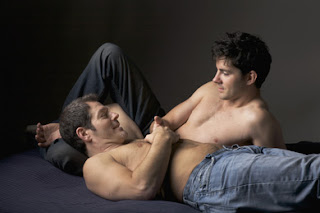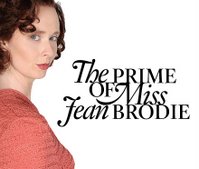Let's put some things on the table first, stipulations, if you will:
- Getting a new play produced, particularly in New York, particularly by a company of the reputation of The New Group, is an incredible feat of effort.
- Provocative topics and situations are excellent fodder for playwrights looking to get attention to their work (see The Submission).
- "Downtown NYC" is a great place to exercise those skills.
- I've seen a lot of lousy theatre in New York and have walked out on the full range, from multi-million dollar Broadway to dusty, uncomfortable black-box off-off-off Bway productions.
- I've even performed in a couple of the latter types.
This play was the first time I've ever walked out despite having been invited to write a review.
I consulted with a few associates about what to do and received a range of responses, two of which I'll paraphrase:
- "don't write a review of a show of which you only saw Act 1"
- "write about what you did see, then explain why you left"
- "write a 'non-review', discussing the circumstances and your decision to leave early"
Producers offer tickets to reviewers like me to get the word out about their shows. I have never had a publicist make any requests or qualifications about what I write, other than holding a post until the show officially opens. As a result, I generally believe my obligation to include seeing the entire show.
Maybe I've been lucky so far. Maybe I've been in more tolerant moods when I saw shows I didn't like. Maybe I've just had nothing better to do on those occasions, but until this weekend, I've never walked out of a show I've been invited to review.
I mentioned having performed in dismal shows produced in less-than-stellar facilities. I've also been in shows when a critic left at intermission and stated that in his review. As an actor, that really hurts. I know that pain.
Still, here's the summary I sent to my associates when I asked their advice on how to proceed:
Tonight I attended a performance of a play following a solicitation to the ITBA. I say attended - actually I left at intermission.So, dear readers (both of you), what advice would you offer?
This particular play, with an interesting premise, was produced by a reputable company of notable pedigree, with a notable director. The actors are skilled and the production values are excellent. The playwright has an interesting resume, and appears to be in an early and successful phase of career.
But the play itself is the problem. From the complete lack of compelling (let alone likable) characters, to the unclear shifts in time periods, to the absurd (and not in the Albee style) dialog and reprehensible actions of some characters, to the gratuitous nudity and simulated sex acts, I found no artistic merit in the literary effort.
I am dumbfounded, not even that someone wrote it, but that others read it and said "hey gang, let's spend the cash to put on this show!"
Burning runs through December 17. Click here for tickets.












